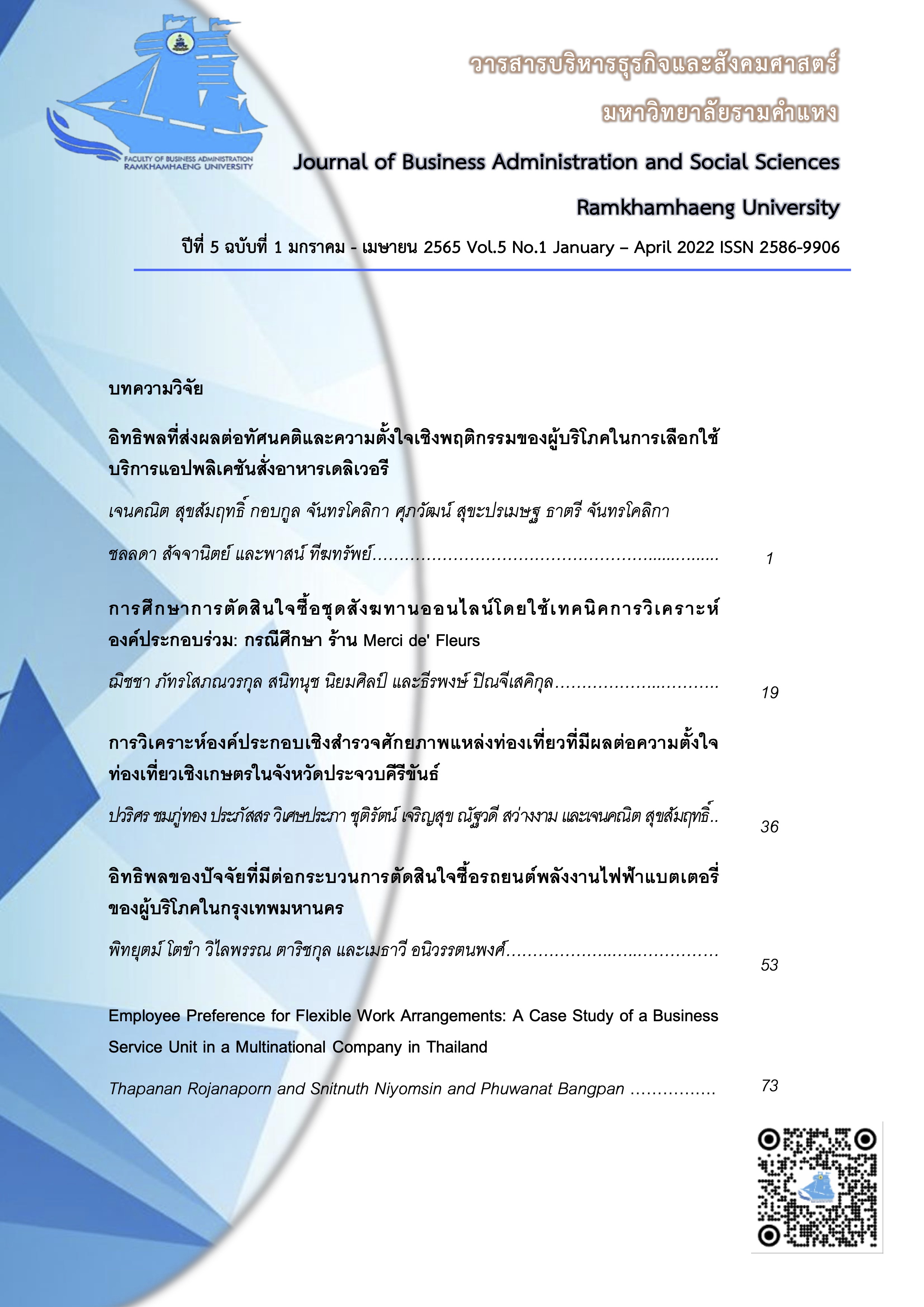Influences on Consumer Attitudes and Behavioral Intentions in Choosing Food Delivery Application Services
Main Article Content
Abstract
In this research investigation, the researchers examine the influences on consumer attitudes and behavioral intentions in using food delivery applications. The conceptual framework was applied from the theory of reasoned action (TRA) and the theory of planned behavior (TPB). Data were collected using the technique of stratified random sampling to obtain 402 consumers using food delivery applications in Bangkok Metropolitan Region. The research instrument was a questionnaire. Data were analyzed using the structural equation modeling (SEM).
Findings showed that hedonic motivation; time-saving orientation; prior online purchase experience; and security and trust were important factors affecting service users’ convenience. In addition, the factors of price-saving orientation; time-saving orientation; and security and trust were important factors affecting post-usage usefulness. Therefore, the factors of time-saving orientation and security and trust affected convenience and post-usage usefulness. It was found that convenience, post-usage usefulness, and attitudes toward the use of applications were important factors affecting consumer behavioral intentions in using food delivery application services.
Article Details

This work is licensed under a Creative Commons Attribution-NonCommercial-NoDerivatives 4.0 International License.
เนื้อหาและข้อมูลในบทความที่ลงตีพิมพ์ในวารสารบริหารธุรกิจและสังคมศาสตร์ มหาวิทยาลัยรามคำแหง ถือเป็นข้อคิดเห็นและความรับผิดชอบของผู้เขียนบทความโดยตรง ซึ่งกองบรรณาธิการไม่จำเป็นต้องเห็นด้วย หรือร่วมรับผิดชอบใดๆ
บทความ ข้อมูล เนื้อหา รูปภาพ ฯลฯ ที่ได้รับการตีพิมพ์ในวารสารบริหารธุรกิจและสังคมศาสตร์ มหาวิทยาลัยรามคำแหง ถือเป็นลิขสิทธิ์ของวารสารบริหารธุรกิจและสังคมศาสตร์ มหาวิทยาลัยรามคำแหง หากบุคคลหรือหน่วยงานใดต้องการนำบทความทั้งหมดหรือส่วนหนึ่งส่วนใดไปเผยแพร่ต่อ หรือเพื่อกระทำการใดๆ จะต้องได้รับอนุญาตเป็นลายลักษณ์อักษรจากวารสารบริหารธุรกิจและสังคมศาสตร์ มหาวิทยาลัยรามคำแหง ก่อนเท่านั้น
References
Ajzen, I. (1985). From intentions to actions: A theory of planned behavior. In Action control (pp. 11-39). Springer, Berlin, Heidelberg.
Ajzen, I. (1991). The theory of planned behavior. Organizational Behavior and Human Decision Processes, 50(2), 179-211.
Alavi, S. A., Rezaei, S., Valaei, N., & Wan Ismail, W. K. (2015). Examining shopping mall consumer decision-making styles, satisfaction and purchase intention. The International Review of Retail, Distribution and Consumer Research, 26(3), 272–303.
Alreck, P. L., DiBartolo, G. R., Diriker, M., Dover, H. F., Passyn, K. A., & Settle, R. B. (2009). Time pressure, time saving and online shopping: exploring a contradiction. Journal of Applied Business Research, 25(5).
Babin, B. J., Darden, W. R., & Griffin, M. (1994). Work and/or Fun: Measuring Hedonic and Utilitarian Shopping Value. Journal of Consumer Research, 20(4), 644.
Bashir, R., Mehboob, I., & Bhatti, W. K. (2015). Effects of online shopping trends on consumer-buying Behavior: an empirical study of Pakistan. Journal of Management and Research, 2(2), 1-25.
Belanche, D., Flavián, M., & Pérez-Rueda, A. (2020). Mobile Apps Use and WOM in the Food Delivery Sector: The Role of Planned Behavior, Perceived Security and Customer Lifestyle Compatibility. Sustainability, 12(10), 4275.
Bridges, E. (2018). Hedonic and utilitarian shopping goals: a decade later. Journal of Global Scholars of Marketing Science, 28(3), 282–290.
Casaló, L., Flavián, C., Guinalíu, M. (2007). The impact of participation in virtual brand communities on consumer trust and loyalty. Online Information Review, 31(6), 775–792. doi:10.1108/14684520710841766
Chang, Y.K., Labban, J.D., Gapin, J. I. & Etnier, J. L. (2012). The effects of acute exercise on cognitive performance: a meta-analysis. Brain Research, 1453 (2012), pp. 87–101.
Davis, F. D. (1989). Perceived Usefulness, Perceived Ease of Use, and User Acceptance of Information Technology, MIS Quarterly, 13(3), 319-339.
Escobar-Rodríguez, T., & Carvajal-Trujillo, E. (2013). Online drivers of consumer purchase of website airline tickets. Journal of Air Transport Management, 32, 58–64.
Hair, J. F., Black, W. C., Babin, B. J. & Anderson, R. E. (2010). Multivariate Data Analysis (7th ed.). Upper Saddle River, NJ: Prentice Hall.
Ingham, J., Cadieux, J., & Mekki Berrada, A. (2015). e-Shopping acceptance: A qualitative and meta-analytic review. Information & Management, 52(1), 44–60.
Jeng, S.-P. (2016). The influences of airline brand credibility on consumer purchase intentions. Journal of Air Transport Management, 55, 1–8.
Jiang, L. A., Yang, Z., & Jun, M. (2013). Measuring consumer perceptions of online shopping convenience. Journal of Service management, 24(2), 191–214.
Jin, B. & Sternquist, B. (2004). Shopping is truly a joy. The Service Industries Journal, 24(6), 1–18.
Kasikorn Research Center. (2020). Food delivery businesses set to expand due to intensifying competition post-COVID-19; while big operators set sight on shaping their platforms into ‘Super Applications. Retrieved from https://kasikornresearch.com/th/analysis/k-econ/business/Pages/z3128-Food-Delivery.aspx
Khajehzadeh, S., Oppewal, H., &Tojib, D. (2014). Consumer responses to mobile coupons: The roles of shopping motivation and regulatory fit. Journal of Business Research, 67(11), 2447–2455.
Kwek, C. & Tan, H. & Lau, T-C. (2010). Investigating the Shopping Orientations on Online Purchase Intention in the e-commerce Environment: A Malaysian Study. Journal of Internet Banking and Commerce, 15. 1-22.
Ray, A., Dhir, A., Bala, P. K., & Kaur, P. (2019). Why do people use food delivery apps (FDA)? A uses and gratification theory perspective. Journal of Retailing and Consumer Services, 51, 221–230.
Rezaei, S., Ali, F., Amin, M., & Jayashree, S. (2016). Online impulse buying of tourism products. Journal of Hospitality and Tourism Technology, 7(1), 60–83.
Salam, A. F., Iyer, L., Palvia, P., & Singh, R. (2005). Trust in e-commerce. Communications of the ACM, 48(2), 72–77.
Suriyamongkol, T. (2018). Consumer experiences, attitude and behavioral intention toward online food delivery services (Master independent study). Thammasat University, Bangkok.
To, P. L., Liao, C., & Lin, T.-H. (2007). Shopping motivations on Internet: A study based on utilitarian and hedonic value. Technovation, 27(12), 774–787.
Venkatesh, V., Thong, J. Y., & Xu, X. (2012). Consumer acceptance and use of information technology: extending the unified theory of acceptance and use of technology. MIS quarterly, 1(3) 157-178.
Wagner, G., Schramm-Klein, H., & Steinmann, S. (2018). Online retailing across e-channels and e-channel touchpoints: Empirical studies of consumer behavior in the multichannel e-commerce environment. Journal of Business Research, 107, 256-270.
Yeo, V. C. S., Goh, S.-K., & Rezaei, S. (2017). Consumer experiences, attitude and behavioral intention toward online food delivery (OFD) services. Journal of Retailing and Consumer Services, 35, 150–162.
Zulkarnain, K., Ismail, Y., Haque, A. A., & Ahmed, S. (2015). Key success factors of online food ordering services: an empirical study. Malaysian Management Review, 50(2), 19-36.


